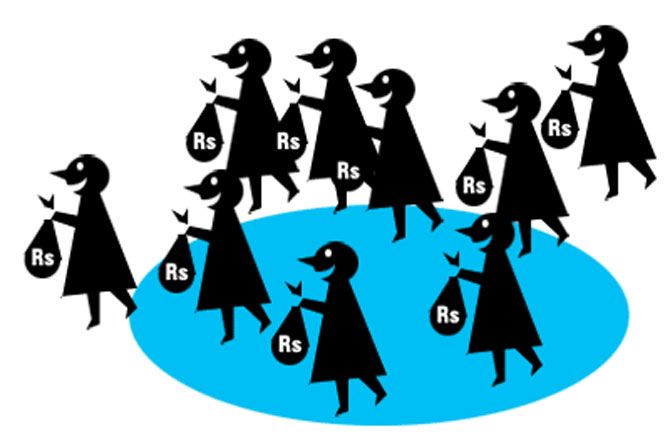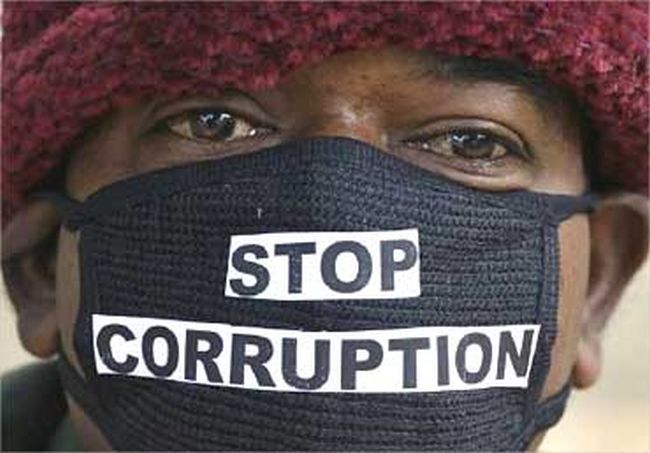'When a newspaper says that Karnataka leads in corruption, one must also know it means Karnataka leads in patronising corruption.'
'You can't be corrupt without me succumbing to your corruption.'
Nikita Puri investigates.
Illustration: Uttam Ghosh/Rediff.com

In May, when the Niranjans (name changed) went to the registrar of marriages office in Varthur (also home to one of Bengaluru's infamous foaming lakes), they were surprised with how smooth things were, till they were asked to step out of the office to cough up Rs 1,400.
They agreed to Rs 1,000.
While the Niranjans were taken aback with the surprising turn of events, the process was more long-drawn for Mahesh (name changed).
After his sixth visit to K R Puram's Regional Transport Office, Mahesh realised he was expected to 'pay up'.
To get a four-wheeler driver's licence for some of us, it purportedly takes more than a rudimentary knowledge of parallel- parking -- it took Mahesh Rs 2,200.
A survey carried out by the New Delhi-based Centre for Media Studies and released by NITI Aayog's Bibek Debroy says Karnataka is the 'most corrupt' when it comes to availing public services.
The survey was carried out in 20 states.
Though Chief Minister Siddaramaiah has questioned the veracity of the survey, the news doesn't make things easier for his government as the state goes into elections next year.
"From what I saw during my tenure, I would compare the gravity of corruption in Karnataka to Bihar or Uttar Pradesh, and I'm not surprised by this report," says former Lokayukta Justice Santosh Hegde.
Last October, when academic and author V Raghunathan was visited by two young constables at his Bengaluru residence (for some verification formalities), Raghunathan was surprised to know that both of them had an MA in political science.
Then why had they not enlisted for direct entry as an assistant sub-inspector?
Weren't they over-qualified to enlist as constables?
After some cajoling, the two finally spoke up.
In 2010, when they had enlisted as constables, the 'going rate' for the senior position was about Rs 8 lakh; they couldn't afford it.
Being a part of the force has not exempted them from paying the money, and the 'rate' has since gone up to about Rs 25 lakh, they told Raghunathan.
The fact that Karnataka had topped this list isn't easily digestible for everyone, including the city's police commissioner, Praveen Sood.
"I personally have very little faith in these surveys. But it doesn't really matter if we are at the top of this list or at the bottom. There is corruption and let's recognise that," he says.
G K Karanth, sociologist and another Bengaluru resident, says "the bridge to development can never be stainless."
The statement, a pun on Bengaluru's plans for the infamous steel flyover, credits corruption to the state's unrestrained evolvement.
Karanth notes how pensioners in Bengaluru were followed by unbounded real estate projects, bringing in more cash, which provided more employment, which in turn brought in some more cash.
"It's no surprise that the rapidest and fastest developing state in the country also became a fertile ground for corruption. When you have money, you'll want to spend it, even when you've jumped a signal," he says.
A few years ago when brand consultant Harish Bijoor introduced himself as a Bengalurean to an American businessman, the latter responded by calling the city the 'corruption capital of India'.
"No city can be really proud of a negative moniker such as this. A city and its image define the people who live in it as well. It is not really only about the governance ethos, as much as it is the attitude of a people as well," says Bijoor.

'When you have money, you'll want to spend it, even when you've jumped a signal,' says G K Karanth.
Photograph: Reuters
Since its inception almost seven years ago, graft-monitoring Web site Ipaidabribe.com has registered well over 9,000 bribes in Karnataka, the highest from any state.
However these figures don't necessarily mean that Karnataka leads in corruption.
There has been wider social media awareness and promotion of the Web site in Karnataka since its promoter, the non-profit called Janaagraha, is headquartered in Bengaluru.
But the online resource dedicated towards uncovering 'the market price of corruption' plainly divulges that there are no upper or lower caps for bribes.
While verification by the police (for passports) make the bulk of the reports, typically people have paid Rs 1,000 to Rs 1,500.
In the government-run Victoria Hospital, patients have paid as little as Rs 20 for an electrocardiogram report they have already paid a fee of Rs 30 for.
Even three decades ago, corruption was such a hot topic in the state that it made for the core material for veteran theatreperson Master Hirannaiah's satire-heavy dramas.
In fact, his assault on corruption was such that politicians stopped coming to his plays, despite receiving invitations.
One of the scenes in a play by Hirannaiah, recounts Justice Hegde, showed a government officer exiting his office after hanging up a board that read: 'Out for lancha.'
One might be forgiven for thinking that lancha (pronounced lunch-ah) is probably 'lunch' with a pronounced south Indian accent, but lancha means 'bribe' in Kannada.
It's important to note that accepting a lancha is only one side of the game; there's someone paying it too.
"When a newspaper says that Karnataka leads in corruption, one must also know it means Karnataka leads in patronising corruption. You can't be corrupt without me succumbing to your corruption," says Karanth.
"It really isn't mono-acting."
The only way to take down a culture of lancha, feel many, is to have a policy of zero tolerance to it.
When Madhukar B V, a resident of Raja Rajeshwari Nagar, went to apply for his Aadhar number, he wasn't aware that there is no enrollment fee.
It was only when he didn't get a receipt for the Rs 110 he paid that he grew suspicious, and realised that the operator in charge had even entered 'Yes' in the box asking for consent for sharing information, when he had specifically said 'No'.
The team at Ipaidabribe, led by former director general of police S T Ramesh immediately took Madhukar's case forward within the UID vigilance team. The corrupt official at this particular Aadhar centre now stands fined and suspended.
Corruption cannot be eradicated by creating institutions to raid people or carrying out stings, says Police Commissioner Sood.
"That's just tamasha. Only transparency in governance combined with empowered citizens can bring about long term changes."
In the past five months that Sood has been in charge, there has been a distinct pro-people attitude seen in the Bengaluru police. This shines through even more with their presence on social media (Facebook, Twitter, Snapchat and even YouTube).
When they aren't posting videos detailing what to do if one's vehicle is towed away, or when one can refuse to be tested for drinking and driving, these pages are rife with memes featuring characters from Game Of Thrones and Netflix's Narcos.
They even had a post with Justin Bieber especially for Bengalureans travelling to Mumbai to attend the pop star's concert.
"Eighty per cent of the effort to fight corruption can be done by our officers, but citizens have to walk the last mile. The only way governance can be improved is when citizens also become involved," says Sood.
What concerns Karanth is that news about the state's corruption is not creating any waves here.
"(It's) Because corruption has become a part of our everyday lives, we've all developed a strong anti-virus to live along with it," he notes.
"Givers must refuse. Givers must go ballistic. Till all of us want an easy life without protest when it comes to corruption, the menace will continue to fester. Fester in lesser and lesser corners, but fester it certainly will," cautions Bijoor.











